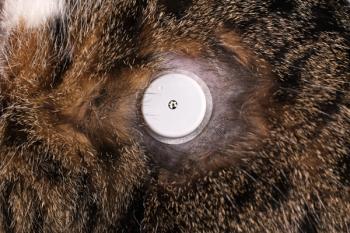
- dvm360 August 2019
- Volume 50
- Issue 8
Purina says its cracked the (egg) code on feline allergens
News that may save more cats from relinquishment: A diet coated in egg powder has been found to neutralize the protein that causes people to experience allergic reactions to cats.
The Fel d1 protein (yellow) bound by IgY antibodies (blue).
Feeding cats a diet coated in a specially formulated egg powder product can neutralize the feline allergens that trigger symptoms in people, Purina scientists announced recently.
In a conversation with dvm360, researchers explained that the major feline antigen present in cats' saliva is a protein called Fel d1, and while scientists don't know exactly what the protein does for the cat, they do know it's responsible for 95% of cat allergies in people-and that one in five people are allergic to cats. All cats, even those that are hairless, produce Fel d1, although levels vary from cat to cat and in the same cat over the course of a year.
Here's what happens: When a cat grooms, it transfers Fel d1 from its saliva and sebaceous glands to its fur. The antigen then spreads into the environment attached to shed hair and dander. It's known to be fairly “sticky,” Purina folks say, clinging with a vengeance to blankets, carpet and curtains in the home and even making its way into public places.
When a sensitive person comes into contact with Fel d1, the allergen binds with IgE molecules in the immune system, triggering mast cell degranulation and an immune response-the misery of sneezing, itching, watery eyes and so on. Cat owners who talk to their doctors about these symptoms often hear that the best remedy is to get rid of the cat; in fact, 18% of cats that end up in shelters are relinquished because of allergies, Purina representatives say. Other allergy-control options include antihistamines, immunotherapy, meticulous cleaning, confinement of the cat to a limited area or some combination of the above. The problem: None of these solutions are especially appealing or foolproof.
Enter this new study by Purina. In a decade-long research effort
Purina scientists report that there was no difference in health parameters between the control cats and the cats eating the special diet, which seems to indicate that the product is safe for cats to consume. They also emphasize that the egg product does not suppress or destroy Fel d1-that protein may play an important role in cats' physiology. Rather, the product neutralizes its allergenic effects, which means there's a greater chance that allergen levels in the environment will stay below the threshold that would trigger symptoms in people.
“These allergens have created a huge barrier to cat ownership and may limit the loving interactions between cat lovers and cats,” says immunologist Ebenezer Satyaraj, PhD, director of molecular nutrition at Purina and lead investigator on the research. “Our discovery has the potential to transform how people manage cat allergens.”
More results from the research will be shared by the
Articles in this issue
over 6 years ago
Heartworm hotspots: When pet travel is the troubleover 6 years ago
Slow growth to the freestanding hospitalover 6 years ago
Say cheese, Mr. Vice President!over 6 years ago
Sunday hours: Worth it or the wrong fit?over 6 years ago
Food for thought: New data on nutrition for veterinary clientsover 6 years ago
Penn Vet to run cannabis clinical trial for arthritic dogsover 6 years ago
Pin the competition: How to make market share to work for youover 6 years ago
The bright side of pet nutrition: Food and the human-animal bondNewsletter
From exam room tips to practice management insights, get trusted veterinary news delivered straight to your inbox—subscribe to dvm360.






